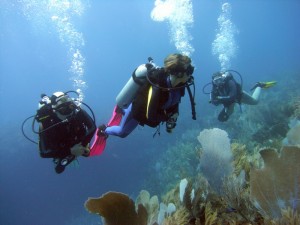Scuba diving is a lifestyle and as avid divers, it’s important to maintain a healthy lifestyle and adhere to important safety protocols and precautions while diving to ensure a safe and enjoyable dive. To be safe, always dive within the limits of your experience and level of training. FamilyDoctor.org provides a good set of rules to follow for safe diving including:
1. Never try a dive in which you’re not comfortable. During descent, you should gently equalize your ears and mask. At depth, never dive outside the parameters of the dive tables or your dive computer (information that helps you avoid decompression sickness).
2. Never hold your breath while ascending. You should always ascend slowly while breathing normally.
3. Become familiar with the underwater area you’ll be diving. Learn which fish, coral and other hazards should be avoided so injuries do not occur. Be aware of local tides and currents.
4. Never panic underwater. If you become confused or afraid during a dive, stop, try to relax and think the problem through. You can also get help from your dive buddy or dive master.

Never dive without a buddy or two
5. Never dive without a buddy and always make sure you are aware of your buddy and their location during your dive.
6. Always plan your dive; then always dive your plan.
7. Be sure that your diving equipment is in proper working condition, has been serviced appropriately, and is equipped to handle the dive you have planned.
8. Don’t drink alcohol before diving.
9. Never dive while taking medicine without prior approval from your doctor.
10. If you have preexisting medical conditions, be sure to discuss them with your doctor to determine if it is safe for you to dive.
11. Cave diving requires advanced skill and experience. It should only be attempted by divers with proper training and equipment.
12. If you don’t feel well or if you are in pain after a dive, go to the nearest emergency room immediately.
13. Don’t fly for 12 hours after a no-decompression dive, even in a pressurized airplane. If your dive required decompression stops, don’t fly for at least 24 hours.
Click here for more information on diver wellness.
Content Provided Compliments of Maduro Dive Fanta-Seas || www.madurodive.com